QuestionI have a 6 mo old German Shepherd Puppy named Daisy. She is amazingly smart and getting bigger by the day. Bigger dog = bigger poops! I've had German Shepherds my whole life and have never had an issue with house breaking them. She goes in one spot in the house and does not realize that outside is for "doing business." She only wants to play when we go outside, and always waited until she's done her thing to start playing outside. The one spot she uses is a room where her crate is kept and, unfortunately, it is out of our view. She is completely crate trained and only has her "accidents" while she is out when we are home. I'm at my wits end with this one. I dont know if we are completely missing the signs (she is my first female) or if there is not hope! What do I do?
There is one other question. I also have a 7 year old Jack Russell Terrier who is crazy (as Jacks are) and I think that his temperament has rubbed off on to the puppy. She has some very serious behavioral issues that are not that bad in small dogs, but they are problems with large dogs...jumping, nipping, pouncing on us while we are laying on the couch, etc. We are looking into some professional dog training but is there anything I can do to make her realize that she does not weigh 20 lbs like the smaller dog?
AnswerWhen you are around you need to keep a close eye on the dog. Use closed doors or gates to keep it in the same room as you are, and perhaps as I do, a short chain fastened to the computer desk. If you catch it in the act, give it a sharp ''Ah, ah, ah!'' and take it out. When you take her out, go ahead and let her play. Activity stimulates the body to eliminate. Do let her be if she stops and starts sniffing around. When she has a bowel movement outside, lavish praise on her.
Consistently is very important in correcting jumping and other problems. Quickly correcting him each and every time he jumps on somebody is very important. He must never get the affection he wants. A number of things have been used. One of the most gentle is to grab his front paws and hold him up. The traditional knee to the chest or step on his paws are fading from use. As part of the the trend away from negative methods, just step backwards leaving his front feet to fall to the floor. After a few tries, the dog may just stand there looking confused.
Young Labs, which I know best, and other puppies tend to very bad about biting. You see a litter of them, and all the ones that are awake are biting another one or themselves. I am not even sure they realize that when they are alone, if they quit biting, they would quit being bitten. At 3 to 4 months they are getting their adult teeth, and it seems they spend every waking moment biting or chewing. One thing you can do at that stage is to knot and wet a piece of cloth. Then freeze it. The cooling will soothe the gums. Only let the puppy have it when you are there to watch it. I maintain a Lab's favorite chew toy is another Lab. Otherwise they settle for any person they can. They keep hoping to find one that won't yelp, jerk their hand away, and leave.
You just have to keep on correcting them, hundreds of times, not dozens. Provide sturdy, safe toys such as Kongs and Nylabones. Avoid things they can chew pieces off and choke on them. Keep them away from electrical cords. Crates are essential for most young Labs and other dogs.
You could try the yelp technique when she pounces on you along with refusing to give her the attention she is seeking.
Not all problems can be solved with a little advice from the net. If you do go ahead with a trainer, make sure the the one you choose uses positive methods. Many are still mired in less effective, harsh techniques from the 50's. In response to their excess, some have gone too far the other way, discarding the highly effective ideas about dominance and pack rank.
You might do well to serve notice to both dogs that you are in charge.
The key to most behavior problems is approaching things using the dog's natural instincts. Dogs see all the people and dogs in the household as a pack with each having their own rank in the pack and a top dog. Life is much easier if the 2 legged pack members outrank the 4 legged ones. You can learn to play the role of top dog by reading some books or going to a good obedience class. A good obedience class or book is about you being top dog, not about rewarding standard commands with a treat. Start at http://www.dogsbestfriend.com/ For more on being top dog, see http://www.dogbreedinfo.com./topdogrules.htm

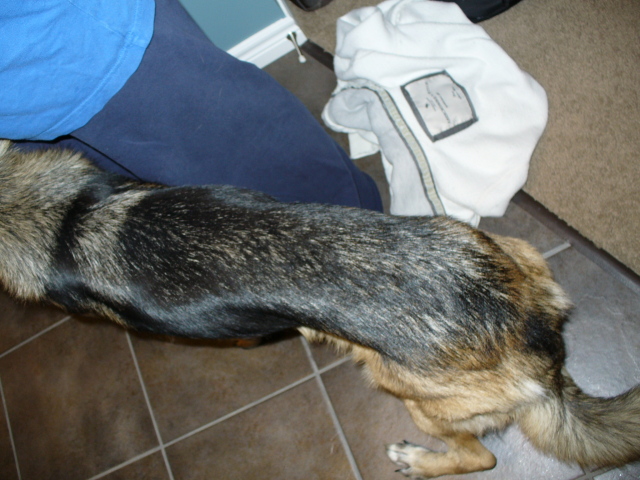 Very thin German Shepherd
Question
Sadie
Hi
We are having problems getting our
Very thin German Shepherd
Question
Sadie
Hi
We are having problems getting our
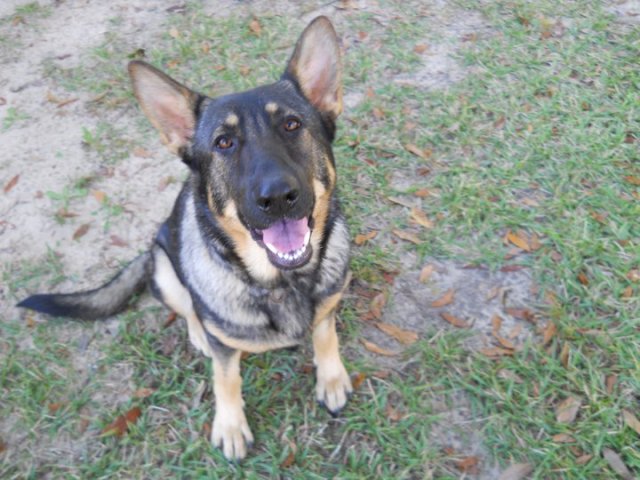 Training rescued German Shepherd
Question
Libby
My boyfriend and I have recently took in
Training rescued German Shepherd
Question
Libby
My boyfriend and I have recently took in
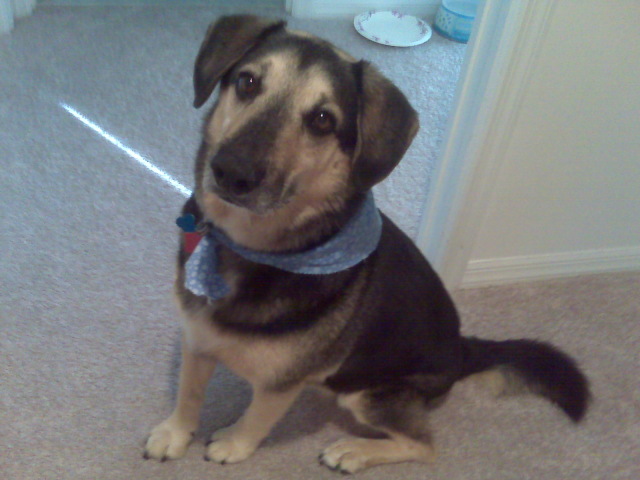 German Shepherd Mix Food
Question
Harley
Hello,
I have a 6 1/2 year old German S
German Shepherd Mix Food
Question
Harley
Hello,
I have a 6 1/2 year old German S
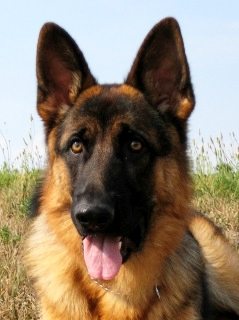 2yo German Shepherd Male
Question
My Boy...
Hi there....I have a 2 year old, pur
2yo German Shepherd Male
Question
My Boy...
Hi there....I have a 2 year old, pur
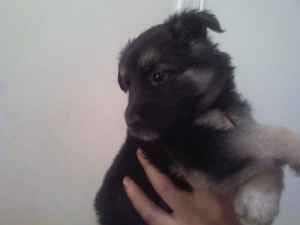 interested in adopting a puppy GSD.
Question
pic of the gsd puppy
Hey, im considering adopt
interested in adopting a puppy GSD.
Question
pic of the gsd puppy
Hey, im considering adopt